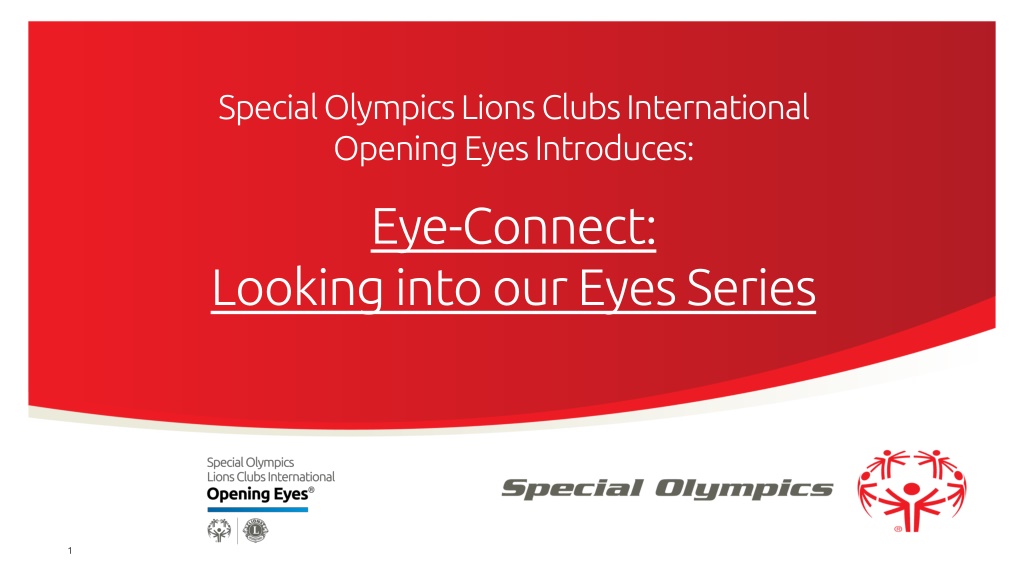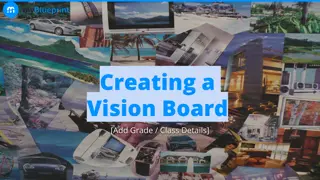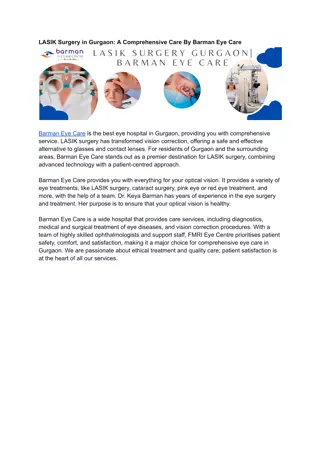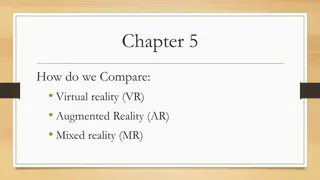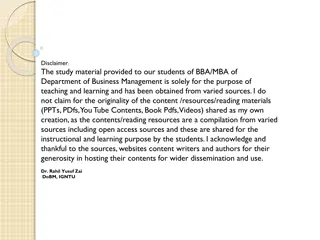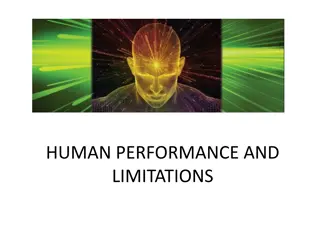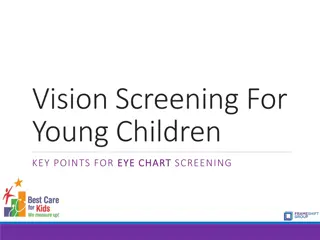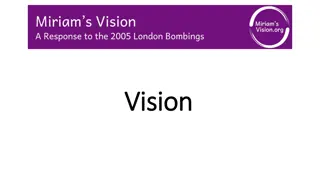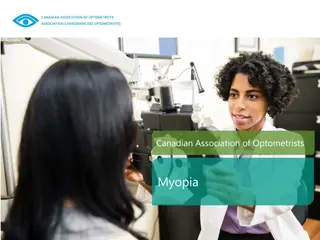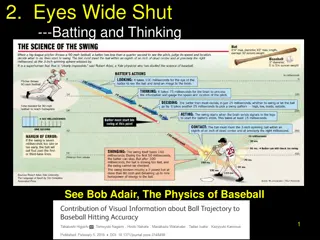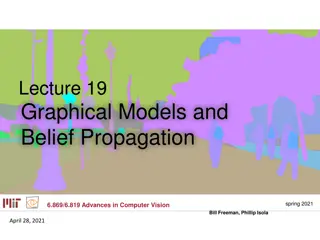Understanding the Importance of Glasses for Vision Care
Special Olympics Lions Clubs International introduces Eye-Connect: Looking into our Eyes Series focusing on the need for wearing glasses, eye care, and regular eye examinations. The series addresses questions on wearing glasses, maintaining eye health, and the impact of the Opening Eyes program. Amidst the COVID-19 pandemic, the series emphasizes the importance of vision care for Special Olympics athletes. The content explores the complexities of vision, how glasses correct vision issues, and the variations in visual impairments.
Download Presentation

Please find below an Image/Link to download the presentation.
The content on the website is provided AS IS for your information and personal use only. It may not be sold, licensed, or shared on other websites without obtaining consent from the author. Download presentation by click this link. If you encounter any issues during the download, it is possible that the publisher has removed the file from their server.
E N D
Presentation Transcript
Special Olympics Lions Clubs International Opening Eyes Introduces: Eye-Connect: Looking into our Eyes Series 1
Eye-Connect: Looking into our Eyes Series Todays topic is about the need for wearing glasses. Why do I need to wear glasses? How can I take care of them? How often should I get an eye examination? Is the Opening Eyes program that same as an eye exam? Q&A
Whydid wecreateEye-Connect: Looking into our Eyes Series? COVID-19 pandemic has affected all of us! COVID-19 pandemic has been shown us that we can continue to work with Special Olympics athletes. We just need to maintain our distance so we can protect each other from the virus.
Lets Get Started Why do I need glasses? To talk about the need for glasses, we need to begin with understanding a little about your eyes and how you see the world: https://www.youtube.com/watch?v=i3_n3Ibfn1c
Wow - Vision is much more complicated! Does light always hit the retina perfectly? No, the eye while amazing is not always perfect. 5 / Special Olympics Lions Clubs International Opening Eyes
How do I know if the light does not fall on the retina in my eye? If the light does not fall on the retina, you will see things a little blurry. Blur due to nearsightedness: Clear image fall on retina: 6 / Special Olympics Lions Clubs International Opening Eyes
Am I always going to see blur? It depends on what is causing you to see blur. If it is simply due to you being nearsighted, farsighted, astigmatism or problems with close up vision, then lenses such as you find in the glasses or contact lenses you wear can correct the problem. 7 / Special Olympics Lions Clubs International Opening Eyes
Are all glasses the same? No. Glasses correct the blur, but the causes are different for different people and the power of the lenses are for you alone. Some people are farsighted which means that they may see better at far then they do up close. Glasses are more important for things like looking at books, devices and computers. 8 / Special Olympics Lions Clubs International Opening Eyes
Are all glasses the same? Other people wear glasses for nearsightedness. Glasses help them see things better at far. Sometimes they will take their glasses off to read but need them to watch television, see people walking across the street or driving. 9 / Special Olympics Lions Clubs International Opening Eyes
Are all glasses the same? As you get older, everyone has more trouble looking at books and things up close. This is normal for everyone. It may mean that you will start to need a bifocal this means that the top of the lens helps you see things far away and the bottom part of the lens helps you see things like a book or your phone. 10 / Special Olympics Lions Clubs International Opening Eyes
Are all glasses the same? Some people with more nearsightedness or farsightedness need to wear their glasses all of the time. This is because that have more blur and it occurs for everything that they view. Athletes will often wear special glasses to protect their eyes from injury. 11 / Special Olympics Lions Clubs International Opening Eyes
Why do athletes wear special glasses? Almost 30,000 eye injuries from sporting activities are recorded in the US. Most can be prevented by wearing spots eye protection. What types of injuries are we trying to prevent: Corneal abrasions scratches on the front of the eye Infections Traumatic cataracts - clouding of the lens in the eye Detached Retinas Fracture of the eye socket broken bone around the eye 12 / Special Olympics Lions Clubs International Opening Eyes
What sports put the athlete at risk? Most eye injuries result from these sports: Basketball Baseball Softball Boxing Paintball Sports that use helmets offer some protection to the eyes: Ice hockey Lacrosse 13 / Special Olympics Lions Clubs International Opening Eyes
How do the sports goggles protect eyes? The lenses should be polycarbonate which are the most impact resistant, light in weight, shatterproof, and provide UV protection from the sun. Sports often have specific requirements make sure that you ask if the glasses were designed for your sport. They will have an ASTM code provided. There should be padding/cushion around the brow and bridge. The frame should fit well not too loose or too tight. 14 / Special Olympics Lions Clubs International Opening Eyes
How do I take care of my glasses? 15 / Special Olympics Lions Clubs International Opening Eyes
Use both hands to put on or take off your glasses 16 / Special Olympics Lions Clubs International Opening Eyes
Do not put your glasses on your head, under your chin, push them up at the nose or fall asleep with them on. 17 / Special Olympics Lions Clubs International Opening Eyes
Wash your glasses everyday! Clean you lenses with warm water and a drop of dish detergent and dry with a soft cloth. Do not use the following to clean your glasses. Clothing - dirt trapped in the fibers can scratch the lenses Paper towels or tissues - these fibers scratch lenses A dirty cloth - if it collects dust, it'll scratch the lenses, rather than clean them 18 / Special Olympics Lions Clubs International Opening Eyes
Wash your glasses everyday! Lenses get smudged with oils and dirt from your face and hands, try not to touch the lenses. When you are not wearing your glasses, they belong in a glasses case. If you put the case in a purse or back pack, use a hard-shell case. Do not lay the glasses down on the lenses the lenses will get scratched. 19 / Special Olympics Lions Clubs International Opening Eyes
What can I do if my lenses are scratched? If the lenses in your glasses are scratched, it is probably time to get them replaced. You can not clean the scratches with soap and water. Make an appointment with your eye doctor to get a comprehensive eye exam. This will include getting your eyes dilated to make sure that you not only see well, get the appropriate prescription for your glasses but also make sure your eyes are healthy. Looking at the health of your eyes not only finds out if you have an eye health problem but can also detect other health problems. 20 / Special Olympics Lions Clubs International Opening Eyes
How often should I get an eye exam? This is challenging to answer: 1. Follow what your eye doctor tells you. 2. For adults that are healthy, every two or three years. 3. If you are over 65 years, you should be seen every year. 4. If you are diabetic (any age), you need a dilated eye exam EVERY year. 21 / Special Olympics Lions Clubs International Opening Eyes
Take care of your eyes! You can take good care of your eyes by: Protecting your eyes from injury during sports - wear protective glasses Protect your eyes from the sun wear sunglasses that are known to protect your eyes from UV light 22 / Special Olympics Lions Clubs International Opening Eyes
Take care of your eyes! Tell someone as soon as you notice problems seeing like: trouble seeing far away or up close have pain, discharge, or other problems with your eyes or vision, notice any other change in vision. 23 / Special Olympics Lions Clubs International Opening Eyes
Take care of your eyes! Early identification of vision problems can often improve the long-term outcome of eyecare. Remember that the Opening Eyes Program doesn t replace eyecare with your personal eye doctor. 24 / Special Olympics Lions Clubs International Opening Eyes
Best wishes for a long life of good vision! Special Olympics Lions Clubs International Opening Eyes 25 / Special Olympics Lions Clubs International Opening Eyes
